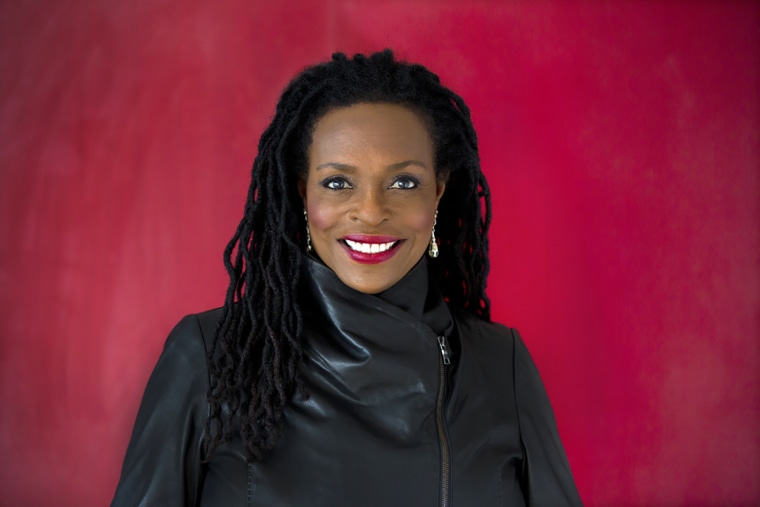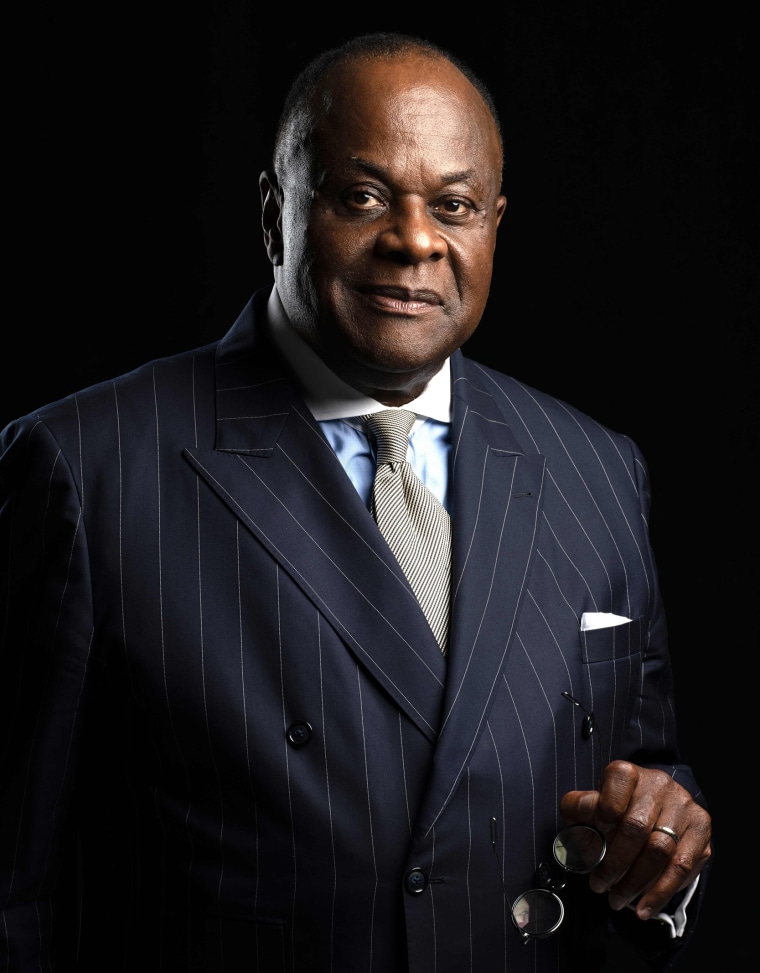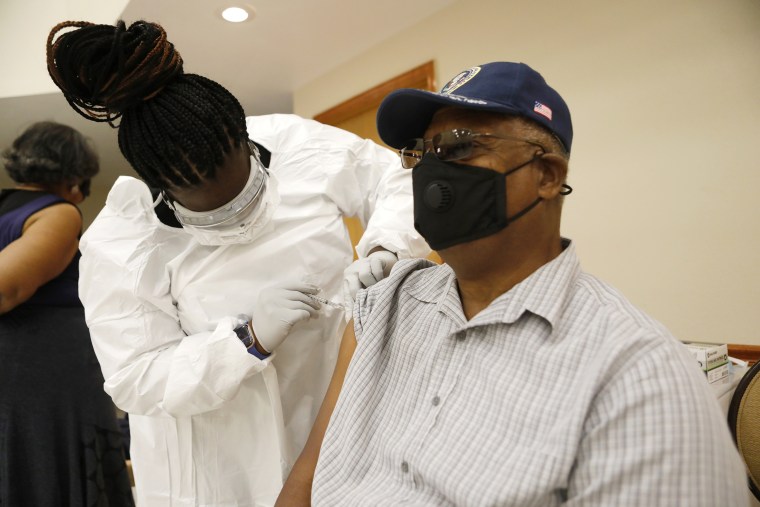John Mayfield had no plans to get a coronavirus vaccine shot and encouraged his 74-year-old mother not to, as well. As a Black man well aware of the medical abuse inflicted on African American bodies in the past, his trust in the inoculations was minimal. But after hearing urgings to sign up during several online church services, Mayfield shifted his perspective.
"I can think for myself," said Mayfield, 54. "But I am also a man of faith. During Covid, I have 'attended' different church services. Recently, I have been getting a consistent message every Sunday — that it's important for Black people to take the vaccine, saying it's the only way to save our people. 'Save our people.' That resonated with me.
"So, because it's coming from the church, I decided I would take it — and take my mother to get hers."
Mayfield, an entrepreneur in Chicago, said: "I am trusting the people I trust. That's what it came down to. And it was impactful that I heard it from many pastors. And the truth of the matter is they are right. We've got to get past this thing that's devastating us, and this is really the only way."
Mayfield's reversal is the kind of reaction Black faith leaders hope for as part of a multi-pronged national mission that includes making the vaccines accessible in areas where Black people have found them hard to get.
Reports indicate that Black people — who have been infected with the coronavirus at a disproportionately high rate — are being vaccinated at alarmingly lower rates. That speaks to two concerns: a lack of access and a lack of trust that the vaccines are safe because of past abuses of Black bodies by medical professionals.
To solve one issue requires solving the other. Black churches are primed to address both.
"We have a role to help Black people understand that — even though there has been a history of misuse and abuse around medicine, around testing, our bodies used for experimentation purposes, etc. — still, if we are going to survive as a Black community, we have to take these precautions," said the Rev. Jacqueline Lewis of Middle Collegiate Church in New York City. "We have to wear a mask and social distance. And we have to get the vaccine as soon as we can so our families can be healthy and whole.
Lewis said it was understandable for Black Americans "to be suspicious of medicine. But we have to take the risk."

That message has been preached in Black churches across the country. Faith leaders understand their standing in the Black community, that they are trusted voices, and they consider the pandemic an urgent time to deliver a consistent, relentless message. Some government agencies, like the Centers for Disease Control and Prevention and the National Institutes of Health, recognize their power, as well, and have sought out Black churches to either spread positive messages to African American communities about the vaccines' safety or to help with the logistics of vaccinations.
"The medical community cannot solve the lack of confidence Black people have by themselves," said W. Franklyn Richardson, pastor of historic Grace Baptist Church in Mount Vernon, New York. "Church is a trusted institution. And we, Black church leaders, are obligated to become very knowledgeable of the problem so we can share truths. The alternative to Covid is not a good thing. If we don't control it, we will continue to be infected and killed 3-to-1 times more than anyone else. That's not a good option.
"Those who are prejudiced against us, who don't care about us, don't want us to take it," he added. "Those who care are recommending, across the board, that African Americans take the vaccine. If you have questions, talk to your doctor, see your pastor."
Richardson is the chairman of the Conference of National Black Churches, which represents more 80 percent of Black Christians in America, or 15 million people across 30,000 congregations, according to its website. The conference, while encouraging its followers to take the vaccine shots, has also pledged to widen their availability by converting churches into inoculation facilities through its Reach, Educate, and Vaccinate, or R.E.V., Program.
Many Black people live in "pharmacy deserts," Richardson said, describing areas where neither clinics nor drugstores are easily accessible. The concern will be addressed through a $7.5 million CDC grant.
The Black church conference has identified 20 cities in need of convenient vaccination locations. It is identifying 20 Black churches in those areas to set up vaccination centers, where CVS, which is partnering in the effort, will play a role in administering the shots.

"We know the cities and states," Richardson said. He said they will be publicly named in a "few weeks," after they are paired with Black churches to become vaccination hubs.
In the meantime, through the Conference of National Black Churches, 3,000 Black pastors over the next 12 months will get training and advice about vaccines, the history of public health concerns and the stigmas that resulted from them. The faith leaders will "go back to churches with materials specific to African American communities to educate," Richardson said.
They hope their message will resonate as it did with Mayfield. But the battle is sure to be challenging. Noble Insights, a Black-owned research firm, convened a focus group in Atlanta to ask Black people why they are reluctant to get vaccinated. The findings: There's a deep uncertainty about what is in each of the vaccines; people say there is contradictory information from vaccine manufacturers instead of a single, comprehensive, easy-to-understand narrative; the inconsistent message creates doubt about the vaccines' effectiveness; and, predictably, the history of past medical corruption creates mistrust.
La Detra White, CEO of Noble Insights, said the influence of faith leaders could knock down all those barriers.
"The church can and will help balance the message streams," White said. "Our people have been leaning on the church a lot longer than we have been trying to get beyond the systemic racism in medicine. And when church leadership speaks, we tend to lean in, listen longer and give deference. So the voice of the church cannot be underestimated or overlooked at this pivotal time in history. They could become the deciding factor between life and death of Black and brown people."
Aware of the harsh reality, Black churches are already taking roles in education and vaccination distribution. In Florida, for example, the development of the Statewide Coronavirus Vaccination Community Education and Engagement Task Force has led to the conversion of seven Black churches into centers to distribute thousands of vaccine doses to people over age 65. The number of churches continues to grow.
Lewis of Middle Collegiate Church saw firsthand how churches can help vaccination access. The church burned down in December after a neighboring building went ablaze. Devastated but undaunted, she partnered with a local synagogue as a site for coronavirus testing and later rolled it into a site for Covid-19 inoculations. Members of her congregation have enthusiastically participated in the efforts.
When Lewis' husband was scheduled for to be vaccinated, a member stood in line for him in the cold — a small gesture but one that speaks to the influence of the church.
"Young adults of congregations are helping out. It's so heartwarming," Lewis said. "They are signing up people to take the vaccine. They are taking people to get their shots, standing in line. This is a 'we are a village' type of thing that is powerful."
And it is work that will not end with the coronavirus, Richardson said.
A plethora of issues "plague our communities," he said. "This pandemic has highlighted how services and access are denied in the Black community. Every measure of health in the country — diabetes, infant mortality, high blood pressure, heart trouble and education, housing, jobs — every one, Black and brown people are at the bottom of the list. And it's going to require a long-term commitment to correcting it, and the Black church has resolved that we will be fighting this fight for a long time."

